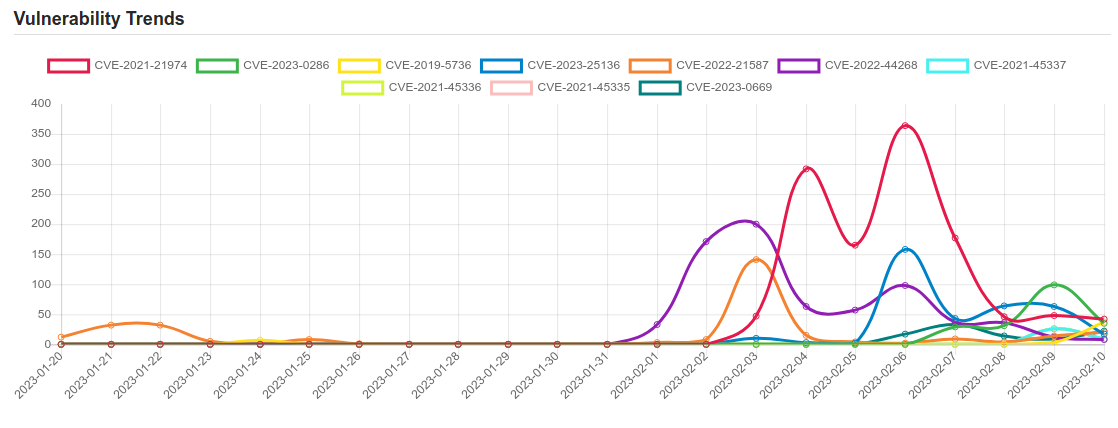Daily Vulnerability Trends: Sat Feb 11 2023

| CVE NAME | CVE Description |
| CVE-2020-28362 | Go before 1.14.12 and 1.15.x before 1.15.4 allows Denial of Service. |
| CVE-2023-25194 | A possible security vulnerability has been identified in Apache Kafka Connect. This requires access to a Kafka Connect worker, and the ability to create/modify connectors on it with an arbitrary Kafka client SASL JAAS config and a SASL-based security protocol, which has been possible on Kafka Connect clusters since Apache Kafka 2.3.0. When configuring the connector via the Kafka Connect REST API, an authenticated operator can set the `sasl.jaas.config` property for any of the connector’s Kafka clients to “com.sun.security.auth.module.JndiLoginModule”, which can be done via the `producer.override.sasl.jaas.config`, `consumer.override.sasl.jaas.config`, or `admin.override.sasl.jaas.config` properties. This will allow the server to connect to the attacker’s LDAP server and deserialize the LDAP response, which the attacker can use to execute java deserialization gadget chains on the Kafka connect server. Attacker can cause unrestricted deserialization of untrusted data (or) RCE vulnerability when there are gadgets in the classpath. Since Apache Kafka 3.0.0, users are allowed to specify these properties in connector configurations for Kafka Connect clusters running with out-of-the-box configurations. Before Apache Kafka 3.0.0, users may not specify these properties unless the Kafka Connect cluster has been reconfigured with a connector client override policy that permits them. Since Apache Kafka 3.4.0, we have added a system property (“-Dorg.apache.kafka.disallowed.login.modules”) to disable the problematic login modules usage in SASL JAAS configuration. Also by default “com.sun.security.auth.module.JndiLoginModule” is disabled in Apache Kafka 3.4.0. We advise the Kafka Connect users to validate connector configurations and only allow trusted JNDI configurations. Also examine connector dependencies for vulnerable versions and either upgrade their connectors, upgrading that specific dependency, or removing the connectors as options for remediation. Finally, in addition to leveraging the “org.apache.kafka.disallowed.login.modules” system property, Kafka Connect users can also implement their own connector client config override policy, which can be used to control which Kafka client properties can be overridden directly in a connector config and which cannot. |
| CVE-2023-21746 | Windows NTLM Elevation of Privilege Vulnerability. |
| CVE-2023-24055 | ** DISPUTED ** KeePass through 2.53 (in a default installation) allows an attacker, who has write access to the XML configuration file, to obtain the cleartext passwords by adding an export trigger. NOTE: the vendor’s position is that the password database is not intended to be secure against an attacker who has that level of access to the local PC. |
| CVE-2023-21838 | Vulnerability in the Oracle WebLogic Server product of Oracle Fusion Middleware (component: Core). Supported versions that are affected are 12.2.1.3.0, 12.2.1.4.0 and 14.1.1.0.0. Easily exploitable vulnerability allows unauthenticated attacker with network access via T3, IIOP to compromise Oracle WebLogic Server. Successful attacks of this vulnerability can result in unauthorized ability to cause a hang or frequently repeatable crash (complete DOS) of Oracle WebLogic Server. CVSS 3.1 Base Score 7.5 (Availability impacts). CVSS Vector: (CVSS:3.1/AV:N/AC:L/PR:N/UI:N/S:U/C:N/I:N/A:H). |
| CVE-2022-46689 | A race condition was addressed with additional validation. This issue is fixed in tvOS 16.2, macOS Monterey 12.6.2, macOS Ventura 13.1, macOS Big Sur 11.7.2, iOS 15.7.2 and iPadOS 15.7.2, iOS 16.2 and iPadOS 16.2, watchOS 9.2. An app may be able to execute arbitrary code with kernel privileges. |
| CVE-2022-24990 | TerraMaster NAS 4.2.29 and earlier allows remote attackers to discover the administrative password by sending “User-Agent: TNAS” to module/api.php?mobile/webNasIPS and then reading the PWD field in the response. |
| CVE-2022-0847 | A flaw was found in the way the “flags” member of the new pipe buffer structure was lacking proper initialization in copy_page_to_iter_pipe and push_pipe functions in the Linux kernel and could thus contain stale values. An unprivileged local user could use this flaw to write to pages in the page cache backed by read only files and as such escalate their privileges on the system. |
| CVE-2020-3992 | OpenSLP as used in VMware ESXi (7.0 before ESXi_7.0.1-0.0.16850804, 6.7 before ESXi670-202010401-SG, 6.5 before ESXi650-202010401-SG) has a use-after-free issue. A malicious actor residing in the management network who has access to port 427 on an ESXi machine may be able to trigger a use-after-free in the OpenSLP service resulting in remote code execution. |
| CVE-2023-0744 | Improper Access Control in GitHub repository answerdev/answer prior to 1.0.4. |
| CVE-2021-21974 | OpenSLP as used in ESXi (7.0 before ESXi70U1c-17325551, 6.7 before ESXi670-202102401-SG, 6.5 before ESXi650-202102101-SG) has a heap-overflow vulnerability. A malicious actor residing within the same network segment as ESXi who has access to port 427 may be able to trigger the heap-overflow issue in OpenSLP service resulting in remote code execution. |
| CVE-2019-5736 | runc through 1.0-rc6, as used in Docker before 18.09.2 and other products, allows attackers to overwrite the host runc binary (and consequently obtain host root access) by leveraging the ability to execute a command as root within one of these types of containers: (1) a new container with an attacker-controlled image, or (2) an existing container, to which the attacker previously had write access, that can be attached with docker exec. This occurs because of file-descriptor mishandling, related to /proc/self/exe. |
| CVE-2023-25136 | OpenSSH server (sshd) 9.1 introduced a double-free vulnerability during options.kex_algorithms handling. This is fixed in OpenSSH 9.2. The double free can be triggered by an unauthenticated attacker in the default configuration. One third-party report states “remote code execution is theoretically possible.” |
| CVE-2022-21587 | Vulnerability in the Oracle Web Applications Desktop Integrator product of Oracle E-Business Suite (component: Upload). Supported versions that are affected are 12.2.3-12.2.11. Easily exploitable vulnerability allows unauthenticated attacker with network access via HTTP to compromise Oracle Web Applications Desktop Integrator. Successful attacks of this vulnerability can result in takeover of Oracle Web Applications Desktop Integrator. CVSS 3.1 Base Score 9.8 (Confidentiality, Integrity and Availability impacts). CVSS Vector: (CVSS:3.1/AV:N/AC:L/PR:N/UI:N/S:U/C:H/I:H/A:H). |
| CVE-2022-44268 | ImageMagick 7.1.0-49 is vulnerable to Information Disclosure. When it parses a PNG image (e.g., for resize), the resulting image could have embedded the content of an arbitrary. file (if the magick binary has permissions to read it). |
A considerable amount of time and effort goes into maintaining this website, creating backend automation and creating new features and content for you to make actionable intelligence decisions. Everyone that supports the site helps enable new functionality.
If you like the site, please support us on Patreon using the button below

To keep up to date follow us on the below channels.





